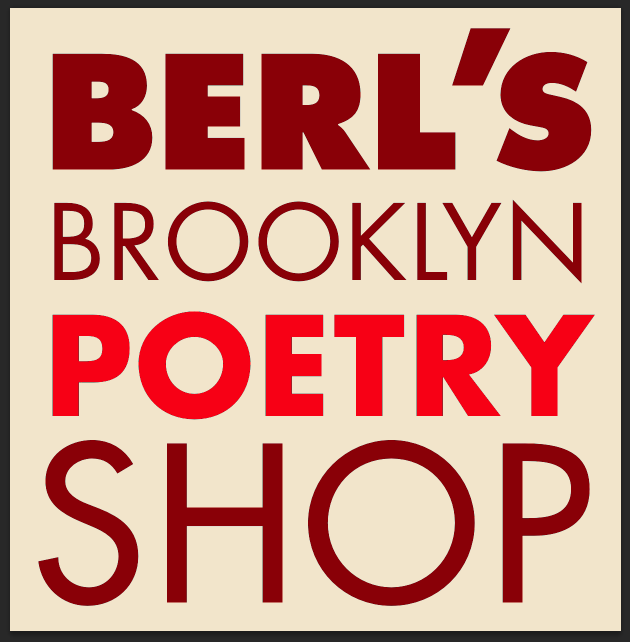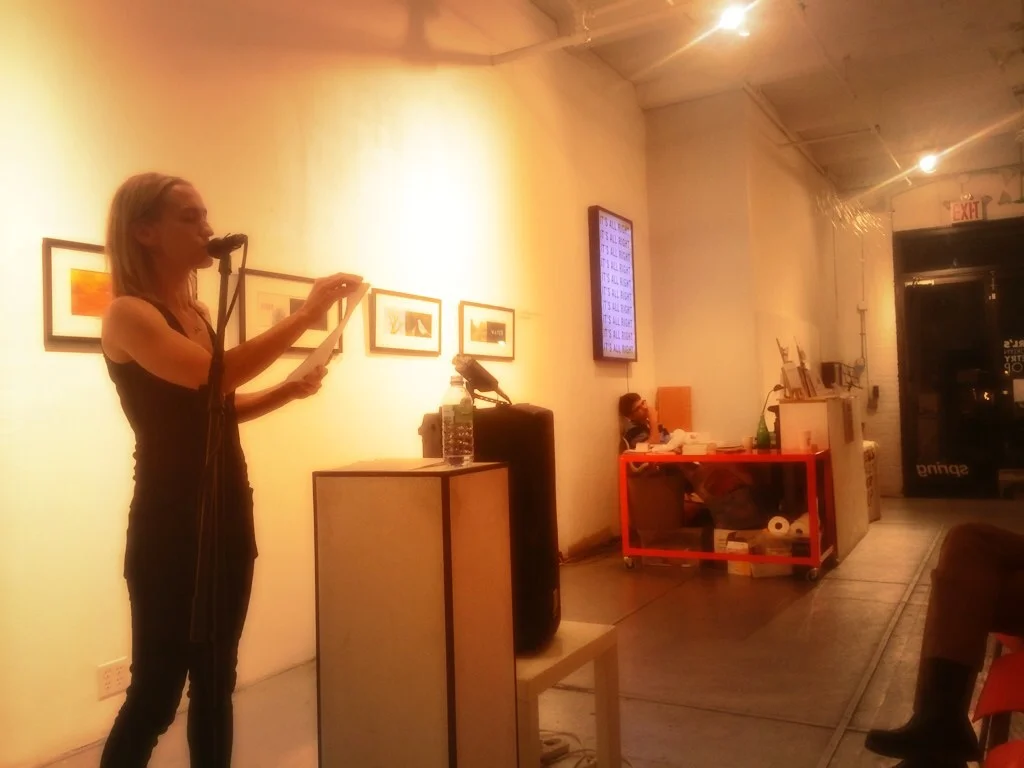A Reading with Jackson Meazle, Sam Truitt, John Coletti and Elizabeth Fodaski
Unfortunately, only the first half of the reading was successfully recorded, featuring readings by Jackson Meazle and Sam Truitt.
Here are Jared's introductory notes for the reading:
I was thinking today while reading the poets about Zukofsky’s pretty memorable lines from A when he writes about his poetry as
“An integral / Lower limit speech / Upper limit music”
I don’t love Z’s idea especially since it suggests poetry caged or even getting crushed in this sort of cinematic torture chamber like the garbage compactor in Star Wars.
But I think it’s a nice way of thinking about the readers tonight.
I was reminded again of these lines when reading JM, who’s visiting from the bay area, where he’s is editor of a great small chapbook press called Gas meter Books, Jackson had a line “I’m writing because I have a new turntable ribbon” sort of suggested to me record player meets the typewriter ribbon, speech meets music.
Speech suggests clarity, meaning, the human and music is sort of numinous and abstract. But what about nonsense speech? Political music?
JACKSON MEAZLE
In an interview with miller Williams, Jackson posed the question
Did you ever have a notion that it was impractical to write poems, or does the poem’s strength lie in its impracticality, its mystery?
Line collage, slyly inserted inside a poem, a “hate Haiku”
please take away / from me this / lacquered placard
poetry as subtraction.
Thick strain of wounded romanticism and mythic dream quest,
“a wolf cruising an empty castle
“we were talking astral figures and sand / that’s the kind of worry I need”
“I even made/ my ghosts/ visit daily”
“Walk the line/through a ring of fire/ Rudderless”
“I was going to write my poem for one whole year”
a lot of hearts in his poem “when the heart is ripped from the body” “no face for the heart / lover no option to buy” “the kiss, if we are home, sprouting from the healed heart”
Jackson has an entire chap in homage to Henrich Heine in which this moment takes place. Heine is of course a capital R romantic poet par excellence whose poems are known as much as the words of famous schumann and schubert artsong lieder, who wrote (Aus Meinen Grossen Schmerzen)
Out of my own great woe
I make my little songs
I love the dramatic understatement and then the treasuring of the little. Jackson as a publisher of little books is himself a sort of a champion of the possibilities of the little. We’re so excited to have him here tonight.
--
SAM TRUITT
In his new book DICK: A VERTICAL ELEGY Sam deploys some of the same lyrical mythopoetry / troubled affect
“I am the four crows on the phone line outside the kitchen window – eight eyes ready to play servant to paranoiac trances in which time’s suspended in spiritual spasms indistinguishable from the ineffably beautiful moment that precedes an epileptic fit”
I think in DICK this is Truitt’s solution to Zukofsky’s dialectic of music vs speech: to create and cultivate “paranoiac traces”: poignant, shifting, unstable, flitting in the in between, near illegible speech, whispers.
DICK is Dramatic and wild, overgrown, a thick dollop of mystery – a book littered with morse code that translates as nonsense (or is it a cypher?), teeming with empty/fill in the blanks acronyms, sometimes in military phonetic alphabet: “facts explode. Faces. PFM. Or what we are ignites what we are-metal wings on a stump flung into ECP. To Lose, sucking rubber, our faces. Or whiskey delta we are on the back of a monitor, our collaborator. It’s a sphere face in. A black sun sucking Alpha.”
The text perforated with Shakespearean stage directions “exeunt alarums” “exeunt omnes bearing torches” … (I kept waiting for the “exit pursued by bear”)
Literally clotted with language, syntax, dots and dashes that take on a physical reality
“Full stop. Over which, like a turnstile, we retch
Shades of Philip K Dick here, a suggestion of paranoia as a state of epiphany or prophesy or truth-telling.
“Like a vast statue, motionless, inert –except an enormous glaucous panopticonic eye unblinking guides in total awareness the birth state”
A book about the Kennedy assassination, it is a book which discreetly does not mention name
The exoskeleton of the book – Shakespeare + Camelot + cryptography - suggests a diffused NSA-ed angle on Barbara garson’s macbird but the actual experience of reading, instead less narrative and more, as Chris Krauss suggests, SCULPTURE, something like the end of the movie the Matrix, when the world itself reveals itself as a scrim of code language.
--
JOHN COLETTI
Here is a sample of John Coletti’s poetry
flicker by bedside
thick water sunlight curb
crushed re-crushed rock
He writes lines that are very discrete and laconic so his poems build up like piles of dense pebbles in a way that might seem superficially cowboy-masculine in a kind of thumbnail stereotype but in practice John’s work complicates this with a pervasive aura of mystery and aural luxuriance so we get lines like “poodle silhouette of sunshine” or word combinations like “earshell stillness” and “sheep distance”
I’m not sure why I zero-ed in on three examples of a formula animal + abstraction but I think there once again is something in this technique, a sort of synthesis of music and speech that is arrived at through invoking human as animal, how we can experience ourselves as animals- as if the answer to Zukofsky is to flip the argument: not straining upward at music, but at speech – the music of conversation - from a subhuman perspective: a lower limit music, upper limit friendship.
--
Elizabeth Fodaski book is called document which suggests some of the same concerns about what a poem is and what it does or documents. Is it something to teach with – document is etymologically linked with docent ? (Liz is a teacher at St Anns) Evidence legal or medical?
In the title poems she offers a kind of slant explanation: “DOCUMENT suggests the oblique task / mastering the world by compression or, / to free the engine of its customs / without insulting the material by which it came / I want neither to sing of roses /nor to make them bloom”
So is this to say poetry as neither music nor speech? Her poems bounce along in a bright andante pace powered by these sorts of paradoxes; poetry as apotheosis or as con job: “In gesticulating histrionically to his captive crowd, the speaker shed his former self and walked away a new man, part worshipped idol, part empty carapace.”
Our new assistant Samantha and I were talking over this book this afternoon and she was struck by the way the form cuts rapidly from a far-off perspective of distance to a close up point of view that is focused and intensely personal.
There are poetic echoes that seem both serious and jokey – Robert Duncan gets punked into “often I am permitted to return to a waxing salon” or Walt Whitman “what is a blade of grass compared to the inner workings of an inner city”
I love how that ‘inner city’ takes on a sort of Saint Augustine quality suggesting the city inside the self. And then where poetry fits into this.
How does poetry fit into a community. How does the community inform poetry. What does it mean to exist in that communication between these forces.
“Mailbox is an oxymoron” she writes.
In a poem called ‘friends and neighbors’ that tunes into the sheer weirdness of being a person among people she moves toward the assertion
“this has nothing to do with aesthetics everything to do with proximity and silence”
and yet the book offers at the same time a sort of mystical faith in words:
“It occurs to you that your language can alter everything”
The last poem is called “Life Sentences” which is a pretty lovely double entendre by the way. Near its end is the amazing line that gets both this sense of affect and irony and possibility “I love you the way I love the “double rhythm of creating and destroying”
So I think maybe all these poets are showing the solution to Zukofsky’s little poetry deathtrap: to let the mechanism such as it is collapse, to let poetry get smooshed and to appreciate the destroyed/created splatter as that lovable thing that poetry.










